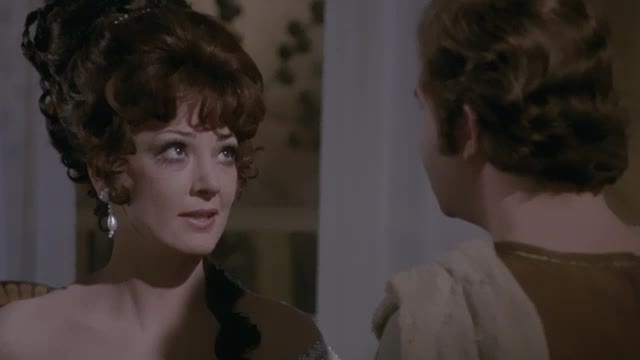Anna Moffo’s parents were Italian, her father a shoemaker. As a child she sang frequently in her home town and surrounding region; and possessing both beauty and a good voice, was offered the chance to audition for Hollywood. Moffo however chose music instead, winning a scholarship to study at the Curtis Institute in Philadelphia, where she became a fully-rounded musician, studying the piano and viola as well as voice with Eufemia Giannini-Gregory (sister of soprano Dusolina Giannini).
In 1954 Moffo won a Fulbright scholarship to train for opera at the Accademia de Santa Cecilia in Rome. Here she was a pupil of Mercedes Llopart and Luigi Ricci and made her operatic debut in 1955 as Norina / Don Pasquale at the Spoleto Festival. Soon afterwards she was engaged to sing the title role in an Italian television film of Madama Butterfly, directed by Mario Lanfranchi (whom she married in 1957). The broadcast of this production in 1956 made Moffo a star overnight in Italy and was followed by performances throughout the country. She quickly appeared in two other television opera productions, as Nanetta / Falstaff and Amina / La sonnambula, and sang Zerlina / Don Giovanni at the Aix-en-Provence Festival with Hans Rosbaud conducting.
At La Scala, Milan (Nanetta), the Vienna State Opera, the Salzburg Festival and the Chicago Lyric Opera Moffo made her debuts in 1957 (the last being also her American debut, as Mimì / La Bohème opposite Jussi Björling). For EMI she recorded Nanetta under Karajan, Musetta / La Bohème opposite Maria Callas and later Susanna / Le nozze di Figaro with Giulini conducting.
Her first appearance at the Metropolitan Opera, New York came in November 1959, with what became Moffo’s signature role: Violetta / La traviata. Of this Harold Schonberg, writing in the New York Times, commented: ‘She has the brains, ability, voice and looks, and if she develops the musical temperament to go along with it, there will be no stopping her.’ Moffo became a favourite at the Met, singing for instance in the 1960–1961 season Gilda / Rigoletto, Adina / L’elisir d’amore and Liù / Turandot (opposite Birgit Nilsson and Franco Corelli with Stokowski conducting). Other important roles included Mimì; the title roles in Manon, Roméo et Juliette and Lucia di Lammermoor; Pamina / Die Zauberflöte; Mélisande / Pelléas et Mélisande; Marguerite / Faust; Nedda / Pagliacci; Rosina / Il barbiere di Siviglia; Rosalinde / Die Fledermaus; the feisty heroine in Offenbach’s operetta La Périchole and all four leading female parts in the same composer’s Les Contes d’Hoffmann.
Moffo made her San Francisco Opera debut (as Amina) in 1960 and also appeared on American television. She recorded extensively for RCA-Victor, most notably as Luisa / Luisa Miller. Back in Italy she hosted two series of the popular Anna Moffo Show (1964 and 1967), appeared in two more film and television productions (of La traviata in 1968 and Lucia di Lammermoor in 1971) and was voted one of the ten most beautiful women in Italy. She sang internationally in Stockholm, Berlin, Monte Carlo, Mexico City and Buenos Aires; appeared at the Royal Opera House, London in 1964 as Gilda (with Solti conducting); during the early 1970s appeared on German television and in television films of the operettas Die Csárdásfürstin and Die schöne Galathee; and made several opera recordings for Eurodisc.
In 1972 Moffo and Lanfranchi divorced and in 1974 she suffered a serious vocal breakdown from which she never fully recovered. Lanfranchi had pushed her too hard. ‘I was working too hard and travelling too much… I was miserable, always away, always alone,’ Moffo later recalled of this period. In 1974 she remarried, to Robert Sarnoff of RCA. Two years later she sought to resume her career, but with little success: she gave her final performance at the Met, as Butterfly, in 1976.
It can be seen now that Moffo was in effect one of the first successful crossover artists, with a large following through her television work. At her best she possessed a warm and rich voice with a velvety lower range, and a strong top; while her agile coloratura technique enabled her to tackle bel canto opera without trepidation. Anthony Tommasini of the New York Times summed up her career thus: ‘For a good dozen years Ms Moffo enjoyed enormous success and won a devoted following at a time when her competition for roles like Verdi’s Violetta, Puccini’s Mimì and Donizetti’s Lucia included Maria Callas, Renata Tebaldi and Joan Sutherland.’
© Naxos Rights International Ltd. — David Patmore (A–Z of Singers, Naxos 8.558097-100).
| Title | |
| OFFENBACH, J.: Belle Helene (La) (Sung in German) (Studio Production, 1974) | |

|
OFFENBACH, J.: Belle Helene (La) (Sung in German) (Studio Production, 1974)
Artists:
Allers, Franz -- Ballmann, Dieter -- Ballmann, Hans-Jurgen -- Kollo, Rene -- Kraemmer, Hans -- Meinrad, Josef -- Moffo, Anna -- Rebroff, Ivan -- Rethel, Simone -- Serafin, Harald -- Stuttgart Radio Symphony Orchestra -- Sundfunkchor Stuttgart
Label/Producer: UNITEL |
